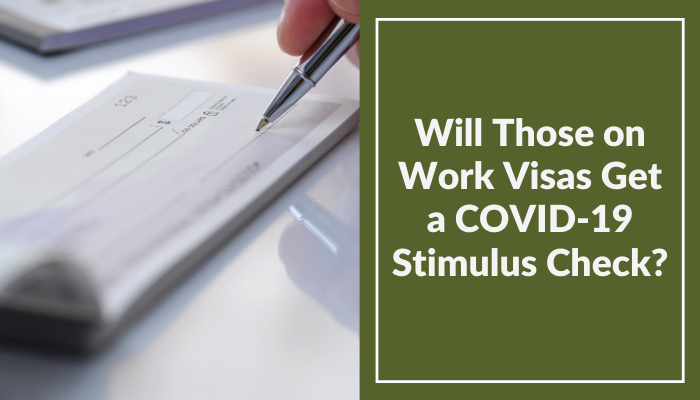Through the COVID-19 economic relief package, many Americans will receive financial assistance from the government, subject to income restrictions. It’s a little more complicated for tax-paying foreign nationals, such as those here on a H-1B or F-1 visa.
The distribution of the stimulus money is not directly dependent on immigration status but on whether the applicant:
- is a U.S. citizen, permanent resident, or qualifying U.S. resident alien;
- is not claimed as a dependent on someone else’s tax return;
- has a Social Security number (SSN) that is valid for employment authorization; and
- has adjusted gross income below the income restrictions based on filing status and the number of qualifying children.
Foreigners who meet the requirements and have the qualifying income thresholds should be eligible to receive the stimulus money. Eligible foreign nationals range from permanent residents to those on temporary work visas, such as H-1B, L-1, TN, O-1, E-3, and others.
The stimulus money is expected to be deposited directly into the applicant’s bank account if one was provided when they filed the tax returns. Otherwise, the IRS will mail the check to the address the applicant used at the time of the last income tax return filing.
Who Qualifies as a Resident Alien?
In general, foreign nationals are considered a U.S. resident alien for tax purposes if the person has been in the United States for more than 183 days in the last year. The applicant must have filed a tax return (Form 1040) for either 2019 or 2018 as a resident alien.
What about Married Couples and Children?
In the case of foreign national married couples filing together (for example, H-1B and H-4 or L-1 and L-2), both must have SSNs to apply. A child is eligible only if both the child and the parents have SSNs.
Who Does Not Qualify?
Not all foreign nationals will qualify to receive the stimulus check. Here are two specific examples.
Certain F-1 Students
Certain F-1 students, even if working, will not be able to meet the resident alien test.
F-1 status can make the F-1 visa holder an “exempt individual” for a certain period of time, and your days of physical presence do not count towards the U.S. resident alien status while you’re an exempt individual. F-1 students are typically not able to count days of physical presence until after they have been present in the United States for a portion of five calendar years.
Foreign students should check with their Designated School Officer and/or tax advisor on whether or not they qualify for a stimulus check.
ITIN Number Holders
ITIN number holders are not eligible.
Will Receiving Stimulus Money Impact the Public Charge Determination?
Likely not. The receipt of stimulus money is not expected to impact the public charge determination. The stimulus payment is considered a tax credit and not a public benefit.
As you can see, this could be a complex issue for many foreign nationals. For more information, please seek guidance from the IRS, tax professionals, and others with expertise in this area. Additional information, including eligibility requirements, can be found at the IRS Economic Impact Payment Information Center.
To stay up-to-date on business immigration news, subscribe to our Immigration News Bites below.
